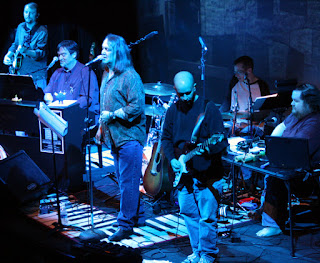Maybe about half of my students in the past few weeks have brought up the Peter Jackson created "Get Back" Beatles documentary. It's made a visceral impact on a lot of people obviously, but it's interesting to note what people take away from it.
 |
| ... when I played in a Beatles tribute band, long ago.. |
- "Being in a band looks interesting!" Yes, being in a band has ALWAYS been interesting. What I feel I miss in being a guitar teacher is the ability to convey "that which has more implications for being interesting than *literally* you can imagine". Which leads to...
- "Wow, it takes more work making music than I thought!" Does it? Another thing I can't convey adequately in lessons is the premise that *making pop music has no rules*. This is both good and bad; it's why 99.9% of what is created is not good, but it's also why both *the pursuit of the good is a reward, and actually getting "good" is a prize you can't get any other way*.
On the other hand: there ARE rules being made. Most professional musicians today have very exact, presumed rules they follow that DID NOT EXIST 30 YEARS AGO. "Rules" about how you "write music" to conform with preconceived notions. "Rules" about how things should be recorded, how they should be performed in order to conform to pre-existing *expectations* that DID NOT APPLY TO THE BEATLES. Or Led Zeppelin. Or the Rolling Stones (definitely not). Or Pink Floyd, Grateful Dead, Jimi Hendrix, et al. Post disco-era in the 70s the process itself changed, and computer recording has made people think the process has to be a particular way. Which leads to..
- "I didn't know that's how you made music!" Well, that's just one way. You're also not seeing the process they each undertook at home. Note they *came in* with music and ideas. While there were some bands, post this era that spend insane amounts of money to sit in a recording studio for $2,000 an hour, hoping something would just materialize out of thin air, the one thing missing in the documentary is the side of "messing around at home to find an idea".
- "That's not how things are done anymore, is it?" No. It's not, in a number of ways. Ways that are endemic to the business itself, but - also in ways that the artists, musicians accept!
The biggest change that has happened in the past 10 years is that "most musicians" now think of themselves as "business people" FIRST. It's at the top of their minds. It's not that making money, being successful wasn't part of music before; it's that now people dwell on it, make their entire focus being *first* "how is this going to be profitable?*.
Instead of "what do I want to create?".
The only point in _Get Back_ where this modern philosophy was evident, was in the discussion about what to do with Paul's song "The Long and Winding Road". Lots and lots of discussion, mainly about whether it fit "the Beatles", whether it was too this or that, on and on. A great song, which became a hit in the U.K. if I'm not mistaken; but they're discussing it as if it's too "strange".
Modern "bands" have that attitude at the front of their minds *all the time* today. Instead of the .02% of what the Beatles and their organization was thinking about, it's 99%.
...and that's why modern pop music is not worth listening to. That's the gist of the cognitive dissonance this movie has made in a lot of people: "wow.... the Beatles *really were better*, that music really is better than what I "thought" I liked made today". The pre-MTV era was better; they were making great art for it's own sake.

